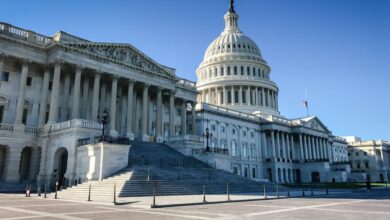How much would Americans of different income save in taxes if the GOP bill is signed into law?

The Trump administration has been pushing for a Republican-backed tax bill that promises “PERMANENT tax cuts and bigger paychecks.” However, experts are cautioning that the proposed legislation would primarily benefit the wealthiest Americans, leaving those lower down the income ladder with only modest gains.
An analysis from the Center on Budget and Policy Priorities (CBPP) revealed that households with over $1 million in annual income could see a 4.3% increase in after-tax earnings if the bill is passed. In contrast, the lowest-earning 20% of Americans would only experience a 0.6% boost, equating to an average of $90 annually. The Tax Policy Center echoed similar findings, predicting a 0.6% increase for the bottom 20% compared to a 3.7% increase for the top 20%.
Despite these disparities, the fate of the GOP tax bill remains uncertain following opposition from five Republican members of the House Budget Committee. These lawmakers expressed concerns about the bill’s lack of significant cuts to federal spending. Additionally, the proposed legislation could lead to cuts in federal programs like Medicaid and food stamps, potentially impacting millions of low- and middle-income households.
A new analysis from the Penn Wharton Budget Model highlighted the potential negative consequences of these cuts. The report indicated that the bottom 20% of households could see a $1,035 decrease in after-tax incomes by 2026, primarily due to reductions in government benefits. In contrast, the top 0.1% of earners could receive an annual after-tax boost of approximately $389,000.
The White House has disputed these analyses, with spokesman Harrison Fields criticizing the experts’ predictions. Fields pointed to an analysis from the Joint Committee on Taxation, which estimated an 11.1% average tax decrease in 2027 under the GOP legislation. The biggest tax reduction was projected for individuals earning $15,000 to $30,000, with a 21.1% decline.
In addition to the tax bill, the impact of tariffs on low-income households has also raised concerns. Experts have warned that higher tariffs could offset any benefits from tax cuts, particularly for those who spend a larger portion of their income on essentials like food and clothing. If inflation rises due to tariffs, the CBPP estimates that the bottom 20% of households could lose $100 per year.
As discussions continue around the tax bill, some Republican lawmakers are advocating for deeper cuts in federal spending and adjustments to Medicaid work requirements. Others are pushing for changes to the deduction cap on state and local taxes. Despite these debates, the core focus remains on extending President Trump’s 2017 Tax Cuts and Jobs Act and implementing additional tax cuts for workers and businesses.
Overall, the GOP tax bill has sparked intense debate over its potential impact on different income groups. While the administration emphasizes the benefits of tax cuts and economic growth, critics warn of the unequal distribution of gains and the potential negative consequences for low-income households. As the legislative process unfolds, the ultimate outcome of the bill remains uncertain.





